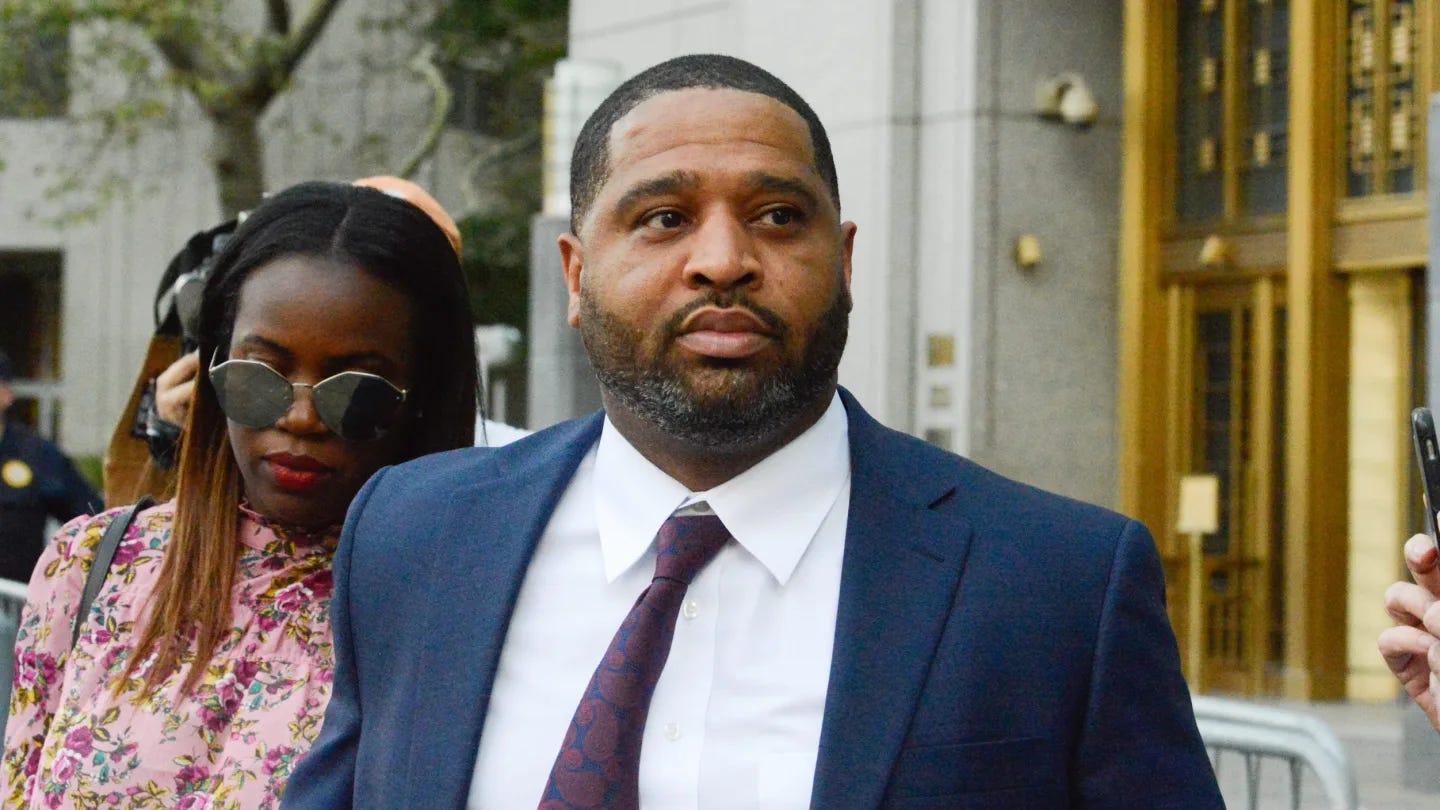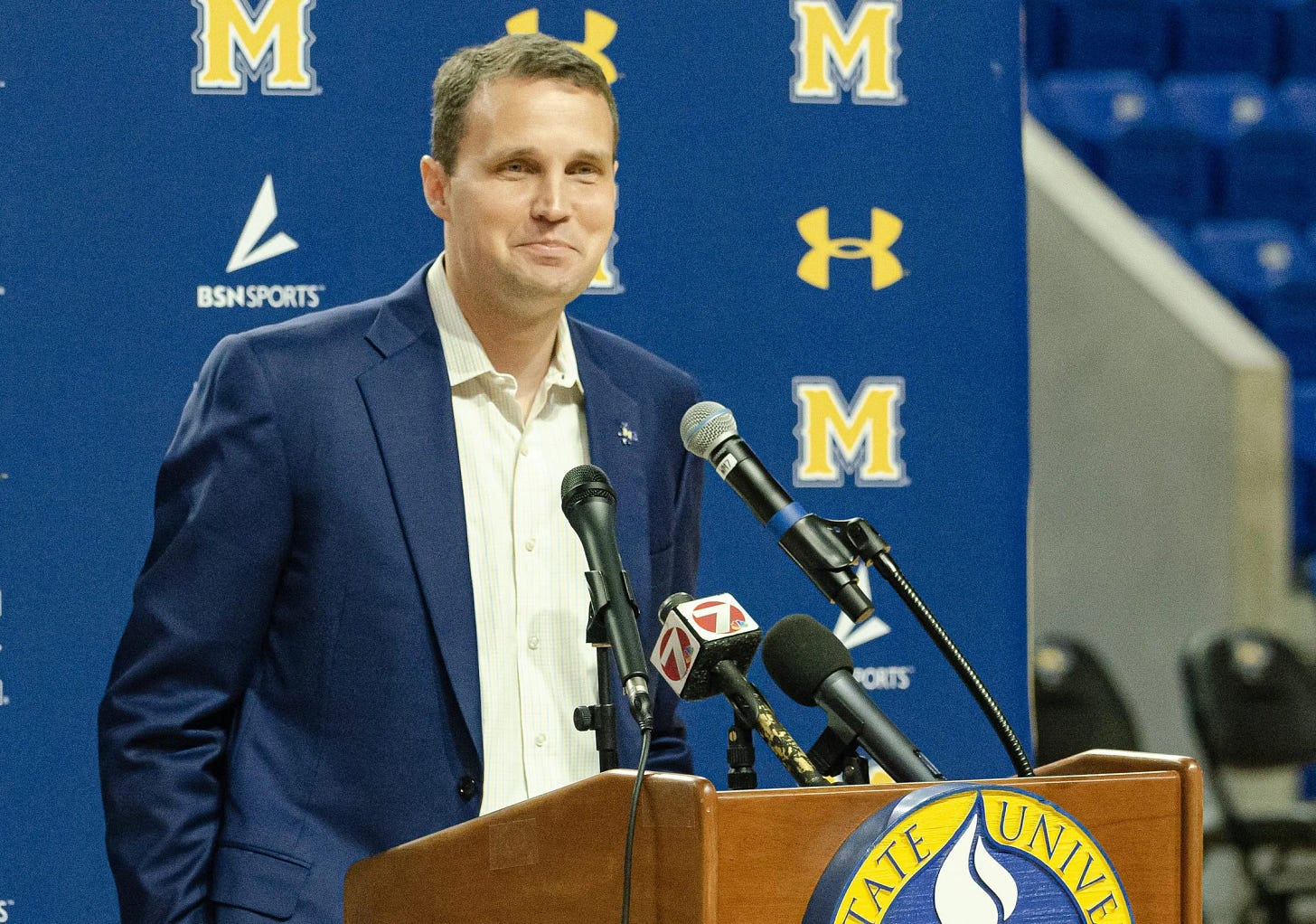The FBI investigation into college basketball didn’t change the sport. It just scapegoated Black coaches
Six years after the feds claimed they had the playbook of misbehaving colleges coaches, little in the sport has changed beyond Black assistants whose careers have never recovered
Even by the standard of introductory press conferences, no ounce of grandiosity was spared by McNeese State University on March 13 when it unveiled Will Wade as its next men’s basketball coach.
The school’s head of athletic communications opened the event by calling it a “glorious day.” A highlight reel set to Ohana Bam’s song “Make Way for the King” was played on the arena’s video board. Athletic director Heath Schroyer, himself a Division I head coach for 12 years, spoke of McNeese, which has made just one NCAA Tournament since the Berlin Wall fell, as a sleeping giant that “has just awoken.”
“Ladies and gentlemen, today is a defining day,” Schroyer said. “It’s a defining moment in McNeese basketball and for McNeese State University.”
McNeese’s hiring of Wade carried a symbolism that went well beyond a mid-March pep rally in Lake Charles, La. It was emblematic of how much the landscape in college basketball had changed in only about five years.
Today marks six years since the FBI and the office of the U.S. Attorney for the Southern District of New York announced they had arrested 10 individuals after a lengthy probe into corruption in college basketball.
The bribery scheme, which centered around coaches at major Division I programs accepting financial inducements to steer top players to certain managers and funneling money to ensure those players ended up at certain schools, had no shortage of tentacles. It involved assistant coaches, agents, shoe company executives, financial advisors, low-level hustlers and even a clothier. The narrative laid out by federal law enforcement was gripping, painting the picture of a fundamentally broken sport that more closely resembled “Goodfellas” than “Hoosiers.”
In a press conference filled with enough hyperbole to make the officials at McNeese blush, one line in particular stood out.
“We have your playbook,” said FBI assistant director William Sweeney.
Six years later, it stands as a largely empty threat. The day of reckoning that was supposed to shake the sport to its core never arrived in the way so many breathlessly envisioned that day.
This past March provided perhaps our best, most searing evidence yet about how little had changed.
Twelve months after being fired in shame by LSU after an NCAA investigation found he had committed three Level I violations, Wade was excitedly welcomed by McNeese after it held off a handful of other suitors. Rick Pitino, who was fired by Louisville in Oct. 2017 after the Cardinals were ensnared in the FBI sting, was given a door back into major college basketball when he was hired by St. John’s to resurrect a chronically underachieving program. Sean Miller, whose Arizona program was one of the primary perpetrators in the FBI’s case, was finishing up his first season at Xavier, where he led the Musketeers to 27 wins and their first Sweet 16 in nearly a decade.
It was in the metaphorical shadows of the sport, far from the bright lights of those cheery press conferences, where the true and lasting impact of the investigation was most evident.
The FBI and the Department of Justice didn’t change college basketball, or at least not in the way Sweeney and other officials believed it would that fateful late September day. If anything, they just scapegoated Black coaches.
Among the 10 individuals arrested six years ago were four Division I assistant coaches, all of whom were at power conference schools – Arizona’s Emanuel “Book” Richardson, Auburn’s Chuck Person, USC’s Anthony Bland and Oklahoma State’s Lamont Evans. All four were charged with accepting between $13,000 and $100,000 in bribes to push players to sign with particular agents and advisors. Two of the four, Richardson and Evans, went to prison, each serving a three-month sentence.
While the specifics of their respective cases vary, all four share two common traits:
1) They’re no longer working in college basketball and haven’t since the day they were arrested
2) They’re Black, while the head coaches they served under are white and are still leading major-conference programs six years later
“That bothered me,” Tulane coach Ron Hunter told me in 2019. “Those four guys weren’t the guys that caused the issues that we’ve got in this business. But what came out of it were four African-Americans that had to go to trial and that became the face of college basketball. That was one of the low points I’ve had in this business.”
That discrepancy is rooted in a structure that has been foundational to the sport for years, if not decades, and remains in place today.
While Black representation among major-conference head coaches has improved since the unveiling of the FBI’s findings – it’s at 32.5% today, up from 18.7% six years ago – it still lags significantly behind the number of minority assistant coaches. In those same six major conferences heading into this season, Black men account for 60.4% of assistants.
It’s a crucial distinction.
Though that latter figure could be viewed as a robust pipeline for future, more lucrative opportunities as a head coach, the assistant coaching ranks are littered with men who are there for a specific, sometimes unspoken purpose – to recruit. That gap of nearly 30 percentage points is illustrative of what many Black coaches in the sport see as the widely held view that their best, most effective skill isn’t coaching players, but getting them to commit to a school.
“In some peoples’ minds, there’s a difference between relating to players and running a program,” former Tulane and Miami coach Perry Clark told me in 2019.
Oftentimes, that difference pigeonholes those coaches and leaves them in a vulnerable position operating in college basketball’s murky morass.
It’s the way the sport is designed. The Black coaches often hired to “connect” with a player pool that’s overwhelmingly Black in the six power conferences are left to navigate a world in which NCAA rules have to be broken to varying degrees in order for a competitive roster to be built and for the coaches to hold on to their jobs in a ruthlessly unforgiving profession.
Since the assistants are the ones primarily dealing with players during the recruiting process, head coaches, or at least the shrewd ones, are offered a level of protection from whatever transgressions occur in gyms, offices and back rooms across the country.
The NCAA’s findings in its various investigations stemming from the scandal bear this out. Pitino and Miller, for example, both managed to avoid sanctions from the NCAA’s Independent Accountability Resolution Process. Wade was found to have offered or provided impermissible payments to at least 11 recruits or those close to them to get them to go to LSU, but considering this is the same person who was caught on an FBI wiretap discussing a “strong-ass offer” for a player, it’s fair to say he’s not exactly the most cautious tactician.
Coaching dynamics and the NCAA’s enforcement arm shield those coaches, the majority of whom are white, from the most serious, potentially career-ending repercussions. Even if they are found guilty, like Wade, it only takes one school desperate enough for basketball glory to get back in the game.
It’s why Bruce Pearl at Auburn and Andy Enfield at USC have both inked six-year extensions in the past 24 months while Person and Bland, their former assistants, both narrowly avoided going to prison and have little, if any, viable avenue back into the Division I coaching ranks. When Miller was fired by Arizona in 2021, it wasn’t because of what happened four years earlier, at least not directly. It was because a program that regularly won Pac-12 titles and made deep NCAA Tournament runs earlier in his tenure had gone 55-35 in his final three years and, because of that, he became expendable. Within a year, a cushy new gig at a well-resourced program with a recent track record of success awaited him while Richardson, his former right-hand man, was working to rebuild his life and career three-and-a-half years after being released from federal prison.
Others linked in some way to the investigation have only suffered so much. Kansas and coach Bill Self won the national championship in 2022 and have been a No. 1 seed in three of the past five NCAA Tournaments. Miami and coach Jim Larranaga, after three sub-.500 seasons, have made deep NCAA Tournament runs in each of the past two seasons, including the program’s first-ever Final Four in 2023.
Beyond those four assistants being arrested and Pitino losing his job – which was due more to an accumulation of missteps than the FBI probe itself – not much else changed.
The NCAA appointed a 14-member committee featuring, among others, Condoleezza Rice, Grant Hill and David Robinson to examine solutions for a seemingly vast mess.
Their two primary recommendations have failed to take hold. The so-called one-and-done rule which forces top recruits to wait until they’re 19 years old and a year removed from high school to enter the NBA Draft is still in place and was not addressed in the new collective bargaining agreement that was signed in June and runs through the 2029-30 season. The other salve – to limit the power and influence of shoe companies in the recruiting process – would require overhauling the entire funding and organization of grassroots basketball in the country. Schools were only so deterred by the role of shoe companies in the scandal, anyway. Kansas, which was implicated in the investigation, extended its deal with Adidas through 2031 back in April 2019, only 19 months after the FBI’s chesty press conference.
The NCAA’s rules around players being able to earn compensation changed, sure, but that was necessitated by a Supreme Court ruling, not the mask of the amateur ideal being ripped off by the feds years earlier. Even in the age of more liberal name, image and likeness rules, what was deemed illegal then would still be that way today.
None of this is to say coaches like Wade, Pitino and Miller don’t deserve the new opportunities they’ve been presented. Their greatest sin was overseeing programs that offered players a small slice of the immense, generational wealth that they’ve helped create for others. But if they’re back in the sport, shouldn’t the Black assistants who suffered the most severe punishments get to enjoy the same fate?
Immersed in the bluster of McNeese’s roll-out of its new coach was a salient point. It wasn’t made by a university president, athletic director or any other high-ranking administrator at the university, but Wade himself as he spoke at the dais.
“After everything that’s gone on, my career needs a rebirth,” he said. “Let’s be honest, right?”
Indeed, he was being honest. But what he didn’t say was just as true – that you have to look like him to be able to get that sorely needed second chance.
(Photos: Getty Images, American Press)





